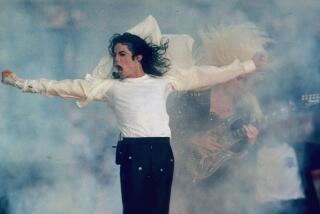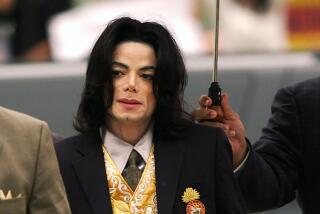The Beatles Could Bail Out Jackson
- Share via
When Michael Jackson bought the publishing rights to the Beatles catalog for $47.5 million two decades ago, he said the song he coveted most was “Yesterday.” In those brighter times, his own troubles seemed so far away.
But today is another matter.
Jackson not only is standing trial for alleged child molestation, but he also faces debt so crushing that his handlers are pushing him to shed a substantial stake in the Fab Four’s fabled songbook -- something the self-proclaimed King of Pop said he would never do.
Although speculation has long swirled about whether Jackson eventually would be forced to part with an asset valued at as much as $500 million, rumors of a possible sale have gained velocity in recent days as the singer’s representatives have leaked word of their renewed efforts to keep creditors at bay.
There’s general agreement that no deal is imminent. But a consensus is building among Jackson’s advisors and others in the recording industry that he may have no other way to pay an estimated $270 million in Bank of America loans he has used to underwrite his famously lavish spending.
The clock is ticking. The potential of Jackson’s defaulting on those loans could be greatly increased should he be found guilty by the jury now hearing testimony in Santa Maria. With his recording career on the slide for years, Jackson’s only other way to generate quick cash would be to hit the concert circuit overseas, where he remains popular.
“If there’s a conviction,” said Los Angeles entertainment lawyer Jeffrey Light, “he loses his ability to go out and make meaningful money as a live performer because he’d be in jail.”
The Beatles songs jointly owned by Jackson and Sony Corp. through a separate entity -- Sony/ATV Music Publishing -- represent a treasure trove of music by the songwriting team of John Lennon and Paul McCartney that generates vast sums every year through licensing and royalty deals. Since the Beatles landed on U.S. soil in the early 1960s, no group has enjoyed such sustained success.
“This band changed music forever,” said Scott Francis, president of BMG Songs North America, another power in the publishing field. “There are always new uses for these songs. New generations are being introduced to this catalog all the time.”
When a song is used in a commercial, film, television show, stage performance, video game or cellphone ring tone, a licensing fee is paid. That revenue is split between the songwriter and the publisher. So every time “Can’t Buy Me Love” is used, for example, half the money goes to McCartney and the Lennon estate, with the rest going to Sony/ATV.
Under one scenario being floated by Jackson’s representatives, he would reduce his interest in Sony/ATV from 50% to 15%. The money he’d make by selling a 35% stake would repay his debts and give him $10 million in cash upfront, while still assuring him a stream of about $10 million a year from the catalog, according to one of the singer’s changing cast of business advisors. Jackson would also receive a one-time $10-million payment.
“He has been reluctant to face reality,” said the advisor, who acknowledged that Jackson had rebuffed previous overtures to sell. “But it’s getting to the point something needs to be done, and he needs to accept that.”
For Jackson, however, owning the publishing rights to the Lennon/McCartney songs has always been more about emotion than money.
Indirectly, Jackson got the idea of buying the Beatles catalog from McCartney himself. It was the early 1980s, and the two were in London working together on a record. After eating dinner at McCartney’s home, the former Beatle showed Jackson a bound notebook filled with song titles McCartney owned. Among them were hits by artists including the late Buddy Holly. Jackson was intrigued. He peppered McCartney with questions about how he could get into the game.
Soon after, Jackson talked to his attorney, John Branca, about buying the copyrights to songs he loved. He snapped up a collection of Sly Stone songs and Dion’s “Run Around Sue.” Making it clear he wanted to buy songs only if they had personal meaning for him, Jackson passed on valuable catalogs when the music didn’t move him. But in September 1984, when Branca told him that the ATV catalog was available, he jumped on it.
ATV was an entertainment conglomerate that in 1969 had purchased Northern Songs, a publishing company established by the Beatles. The catalog was huge -- it included 4,000 songs -- but the more than 200 Beatles songs were the most valuable in the bunch, worth an estimated two-thirds of the catalog’s value.
ATV was then owned by Australian tycoon Robert Holmes a Court. His company, Bell Group, negotiated with Jackson for 10 months. The process was so laborious and complicated that some insiders began calling it “The Long and Winding Road.”
When the deal was done in August 1985, Jackson had triumphed over several other suitors, including London-based Virgin Records and New York real estate tycoon Samuel J. Lefrak.
In 1995, looking to deal with money problems that were surfacing even then, Jackson went from 100% owner to 50% owner after merging ATV with Sony’s publishing arm. The deal also gave Jackson a 50% stake in new songs added to the company’s catalog. That’s why Jackson now profits from the tunes of Destiny’s Child and other young acts, much to Sony’s chagrin.
Branca, who negotiated the Sony/ATV deal, declined to comment on any changes that may be in the offing.
The Sony/ATV catalog generates an estimated $80 million in annual revenue, half from Beatles songs. Although the Beatles songs may be the Hope diamond of music publishing, the ATV collection of songs has plenty of other jewels. They are as varied as Bob Dylan’s classic “Blowin’ in the Wind” and Will Smith’s “Gettin’ Jiggy Wit It.”
Other famous names in the catalog include Garth Brooks, Joni Mitchell, Stevie Nicks, System of a Down, Stephen Stills, Sarah McLachlan, Neil Diamond and Sade.
Jackson’s financial problems could be a blessing for Sony, which has grown frustrated with having to share so much money with the singer from publishing rights obtained since the merger. That includes the Acuff-Rose and Tree Publishing catalogs, the two biggest country music publishing houses.
With no deal on the near horizon, music industry insiders Friday were left to ponder who might make a run at Jackson’s holdings. Most said they’d be surprised if Sony did not have some sort of contractural clause giving it the inside track.
Several high-placed executives at Sony said they had no knowledge of the proposal that Jackson’s advisors were pushing. The company had no official comment Friday.
A publishing business veteran who worked with Jackson in the past said Friday that there would be no bigger symbol of the severity of Jackson’s plight than if he said goodbye to the Beatles.
“It would be very clear proof he is totally destroyed financially,” said this former associate. “He would do anything except that.”
*
Times staff writers Josh Friedman, Meg James and Joel Sappell contributed to this report.
*
(BEGIN TEXT OF INFOBOX)
Songbook
Michael Jackson’s advisors are urging him to give up a substantial portion of his 50% interest in the Sony/ATV Music catalog, which includes 251 Beatles songs. Among them are these notable titles:
“Yesterday”
“Michelle”
“Help”
“The Long and Winding Road”
“Let It Be”
“Revolution”
“A Hard Day’s Night”
“Can’t Buy Me Love”
“Hey Jude”
“Eleanor Rigby”
“Strawberry Fields Forever”
“Come Together”
“Get Back”
“She Loves You”
Los Angeles Times
More to Read
The biggest entertainment stories
Get our big stories about Hollywood, film, television, music, arts, culture and more right in your inbox as soon as they publish.
You may occasionally receive promotional content from the Los Angeles Times.









